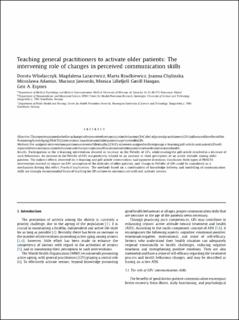Teaching general practitioners to activate older patients: the intervening role of changes in perceived communication skills
Wlodarczyk, Dorota; Lazarewicz, Magdalena Anna; Rzadkiewicz, Marta; Chylinska, Joanna; Miroslawa, Adamus; Jaworski, Mariusz; Lillefjell, Monica; Haugan, Gørill; Espnes, Geir Arild
Peer reviewed, Journal article
Accepted version
Permanent lenke
https://hdl.handle.net/11250/2650656Utgivelsesdato
2019Metadata
Vis full innførselSamlinger
Originalversjon
Patient Education and Counseling. 2019, 102 (9), 1687-1694. 10.1016/j.pec.2019.04.020Sammendrag
Objective
This report examined whether a change in the perceived communication behaviour (PeCoBe) of general practitioners (GPs) influenced the effect of the Promoting Active Aging (PRACTA) intervention on activation of older patients as perceived by GPs.
Methods
Pre- and post-intervention questionnaires were filled out by 225 GPs, who were assigned to three groups, e-learning, pdf-article, and control. GPs self-reported their communication behaviour and their perceptions of the attitudes of older patients toward treatment and health.
Results
Participation in the e-learning intervention showed an increase in the PeCoBe of GPs, while reading the pdf-article resulted in a decrease of such behaviours. An increase in the PeCoBe of GPs was positively related to an increase in their perception of an active attitude among older patients. The indirect effects observed for e-learning and pdf-article interventions had opposite directions.
Conclusion
Both types of PRACTA intervention exerted an impact on GPs’ perception of the attitudes of older patients, and change in PeCoBe of GPs could be considered as a mechanism driving this effect.
Practical implications
The methods based on a combination of knowledge delivery and modelling of communication skills are strongly recommended forms of teaching for GPs on how to communicate with and activate seniors.

